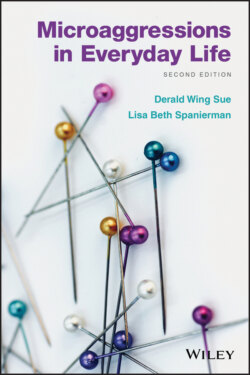Читать книгу Microaggressions in Everyday Life - Derald Wing Sue - Страница 19
Your Analysis Is Flawed
ОглавлениеThe misunderstanding regarding flawed analysis takes shape both in the appraisal of empirical research on microaggressions (“Your research is invalid”) and in evaluations of targets' perceptions of their experiences (“Your accounts are inaccurate”). We find it curious that scholars who have no expertise in studies of racial discrimination feel authorized to step into the racial microaggressions literature, name the overall project, rename the construct, and call for persons who do not acknowledge the influence of racism in society to be involved in generating items for new measures designed to document experiences with microaggressions. If we understand them correctly, these critics are seeking a set of universal operating principles that we could use to identify microaggressions reliably across all persons from a particular marginalized group (see, e.g., Lilienfeld, 2017). We disagree with this idea of homogeneous microaggression experiences, and instead we acknowledge within‐group differences in how people interpret microaggressive statements. With a focus on context, we recommend investigations that seek to understand moderators (e.g., targets' interpretations) of the link between microaggressions and negative outcomes. Since the publication of the first edition of this book in 2010, there have been hundreds of studies conducted on microaggressions. In the chapters that follow, we draw from the research to document the current state of the field and signal directions for future investigation.
Critics also point to supposed flaws in the scientific investigation of microaggressions (e.g., Lilienfeld, 2017; Nagai, 2017). They claim that interview questions have been biased because they ask respondents directly about their experiences with subtle forms of discrimination (Nagai, 2017). As we describe in Chapter 7, purposive sampling, which refers to selecting respondents because they have substantial experience with the phenomenon of interest, is a common practice in rigorous qualitative research (Patton, 2015). Critics also offer related critiques of microaggressions research, such as small sample sizes (Nagai, 2017) and lack of validity of subjective reports (Lilienfeld, 2017) that generally are postpositivist critiques of qualitative research. We refer readers to Chapter 7, where we highlight the importance of methodological diversity (qualitative and quantitative) in psychological research.
When critics challenge reports of microaggressions from members of marginalized groups, we understand such reports as subtle and perhaps even unconscious expressions of dominance that reassert the power to define reality. The argument is that if it was not intended as a microaggression, then it is not one. For example, we often hear remarks such as “You're being hypersensitive” and “Maybe the gate agent reminds every person, regardless of race, that they are only boarding first class.” Sometimes there is a suggestion that naming the problem of microaggressions makes things worse. We have heard these statements: “You may be the one promoting disharmony in our community because of the way you interpreted the event” and “People who complain about microaggressions are entrepreneurs of outrage.”
It is possible that dominant‐group members fear what it means to allow people who have been marginalized historically to give testimony to their experiences. A poignant example exists in Lee Mun Wah's video, Color of Fear, in which a group of men from different racial backgrounds come together for a retreat to discuss racism and race relations. Despite testimony after testimony about their experiences with racism from each of the men of color, one of the White participants, David, continually expresses doubt about the credulity of their accounts. He referred to them as “unfounded” and even implied that the men were blocking their own progress. During a tense moment in the group, Lee Mun Wah made a critical intervention when he asked David, “So what's keeping you from believing that that's happening to Victor (an African American man)?” David replied, “Because it seems like such a harsh life. And I just don't want to believe—I would assume, Victor, that your life is really that hard, difficult, and unpleasant.” Lee Mun Wah inquires further, “What if the world were not as you thought … [and subtle racism] actually is happening to lots of human beings on this earth. What would it mean to you?” Breaking down in tears, David clearly is overcome with sadness and says that he does not want to accept that humans can be so cruel.
